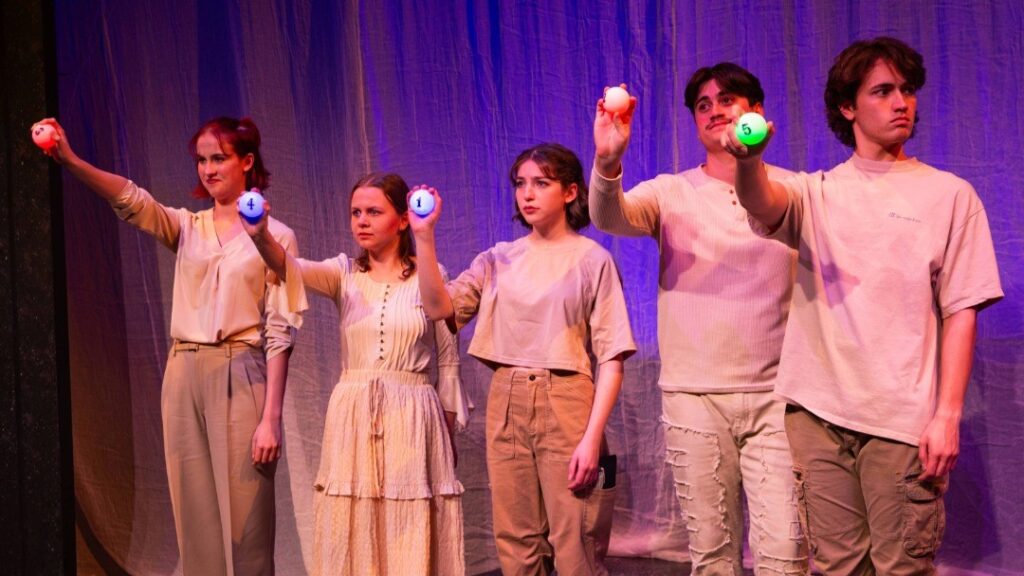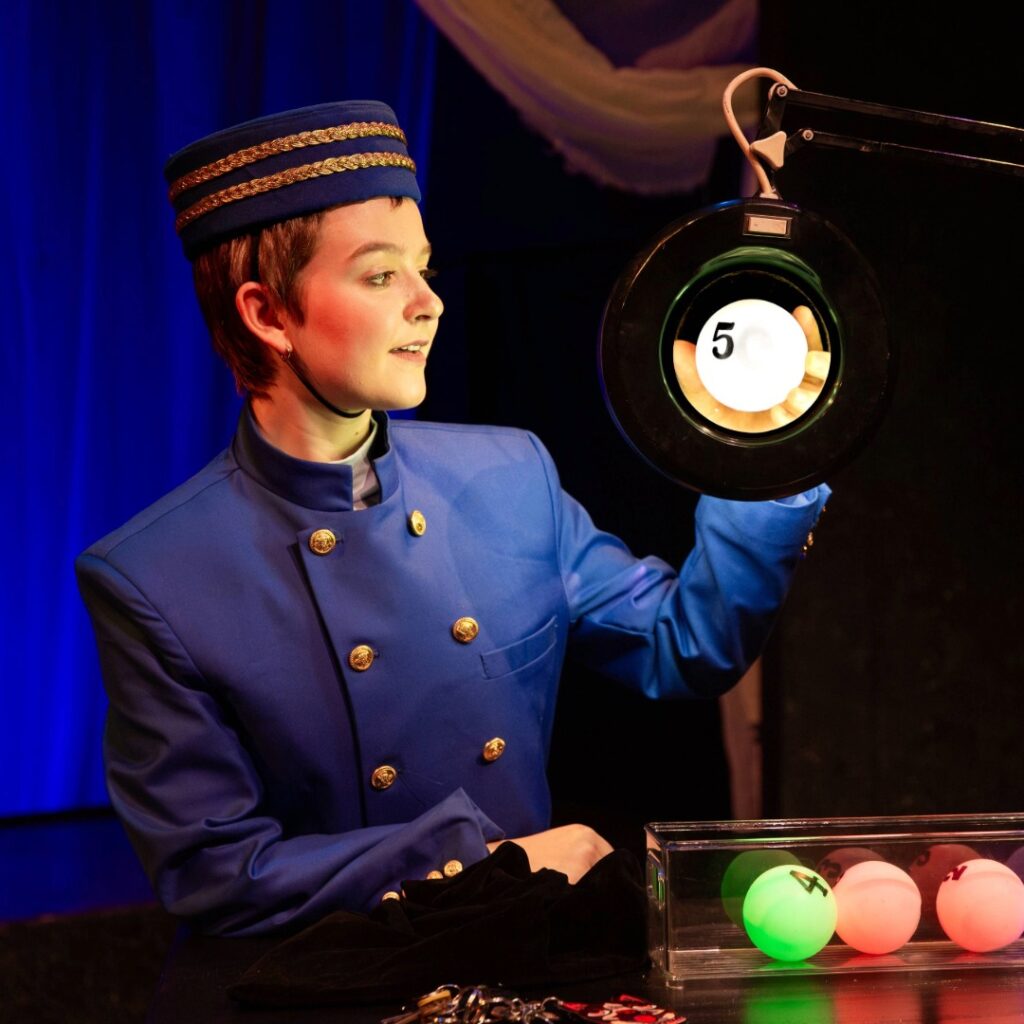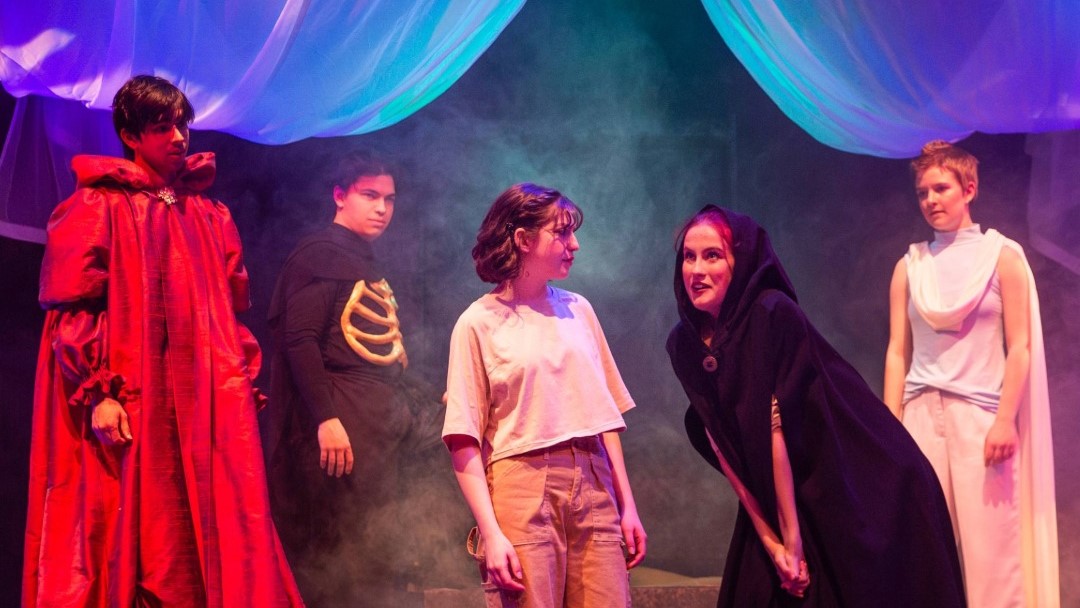SALT LAKE CITY — On Friday, April 5th, 2024 I saw Everybody by Branden Jacobs-Jenkins at the University of Utah. Everybody is a comedic adaptation of a 15th century morality play about death that is explained by the usher (played by Cam Barrett) who traces the history of the play after having spent time requesting everyone turn off their phones, eat their candy wrapped in plastic, and to ensure silence during the production. Afterward, she becomes God, her eyes closed with a single purple/pink spotlight on her. During her monologue, she decides that she wants to know more about how humans have spent their time on Earth and calls for Death (played by Luke Morton) to appear. Death, dressed entirely in black, appears on the stairs off to the side and comes down to learn about what God wants from him.

Everybody is unique in that none of the humans have names (they’re just referred to as Everybody), and they each draw a number to see which actor will play each role. There is a moment of the fourth wall breaking where the Usher comes out to explain this to the audience, as she puts the balls in a bag and each actor draws a number. It’s not explained which number corresponds to what role, but it is explained that each actor learned the script in its entirety so that they could play any role.
Robert Scott Smith‘s directing comes through strongest with the comedic timing, like when the audience can hear characters bickering off stage, or when asked where she got her outfit from, Understanding (played by Cam Barrett) says, “The PTC costume shop.” Some of the physicality of the play was fun to watch, such as watching an actor leap into another actor’s arms. It is obvious that Smith was interested in highlighting the hilarity of the script and helping to make each character very distinct, which was further helped with the costuming by Elizabeth Kennington.

In many ways, Everybody‘s core message is overpowered by the actual production, and when there is a moment to get to the heart of the play, it falls flat. The “main” character (Everybody) is on their deathbed, and before each sequence there is something akin to shadow puppetry depicted on a curtain where skeletal figures are talking to one another, as they explain the “dream” (of meeting Death, and being allowed to take someone with her for her journey to the afterlife).
There’s also the use of lighting (designed by Michael Horejsi) and smoke effects; such as when the souls ask for Death to prove his identity and the stage is flooded with red light as smoke comes out of his jacket while he snarls at them. When Everybody (played by Macey Shackelford) meets the personification of Stuff (played by Zoe Seare), there is a single spotlight on the two of them while the rest of the stage is dark. And during the tap dancing number (choreographed by Erin Farrell Speer), there’s music, confetti is thrown and the lights move around like at a circus.

Even though there seem to be moments of insight, such as Everybody realizing that her friends and family won’t die for her, culminating in an acknowledgement that their relationships might be meaningless and thus feeling abandoned, such as when Kinship (played by Sandra Detweiler) fakes an illness and tries to get a random child (played by Ashlen Boresow) to go with Everybody instead. The last portion of the play felt rushed. After being told she’s dying alone, Everybody meets Love who forces her to chant “I have no control” over and over. She shouts “This body is just meat. I surrender.” There doesn’t seem to be any real correlation between the things Love has her say, why Love is there, and why Love chooses to die with her. This is further undermined when a personification representing all the evil things she’s done and said go into the ground with her as Everybody finally dies.
There’s also an alienating moment in the play where the characters accuse each other of being racist because of the appropriation of Ebonics in the dream. This causes the shadow puppets to argue and later on prompts a character to yell at the dying girl about how he’s not a racist, to which she replies that he’s a “crypto-racist”. This felt like a distraction, though it could’ve been insight into how white people conceive of morality. Although the play ends with the usher encouraging people to be good and kind, ultimately it felt like the message was more so aimed at white audience members. In this specific way, it felt less like Everybody was for everyone, and more a specific type of person.
Everybody is certainly a technical feat that at times breaks the fourth wall and is funny from beginning end; it’s just that the high production quality of the show overrides what is otherwise a lackluster script. Ultimately, it’s the perfect show for anyone who enjoys live theatre, not so much if you’re in the mood for a moral lesson.
[box]Everybody plays Fridays through Sundays at the Babcock Theater (300 South 1400 East, Salt Lake City) on the campus of the University of Utah from April 5-14, 2024. Tickets are $7.50-17.50. For more information, visit theatre.utah.edu.[/box]
